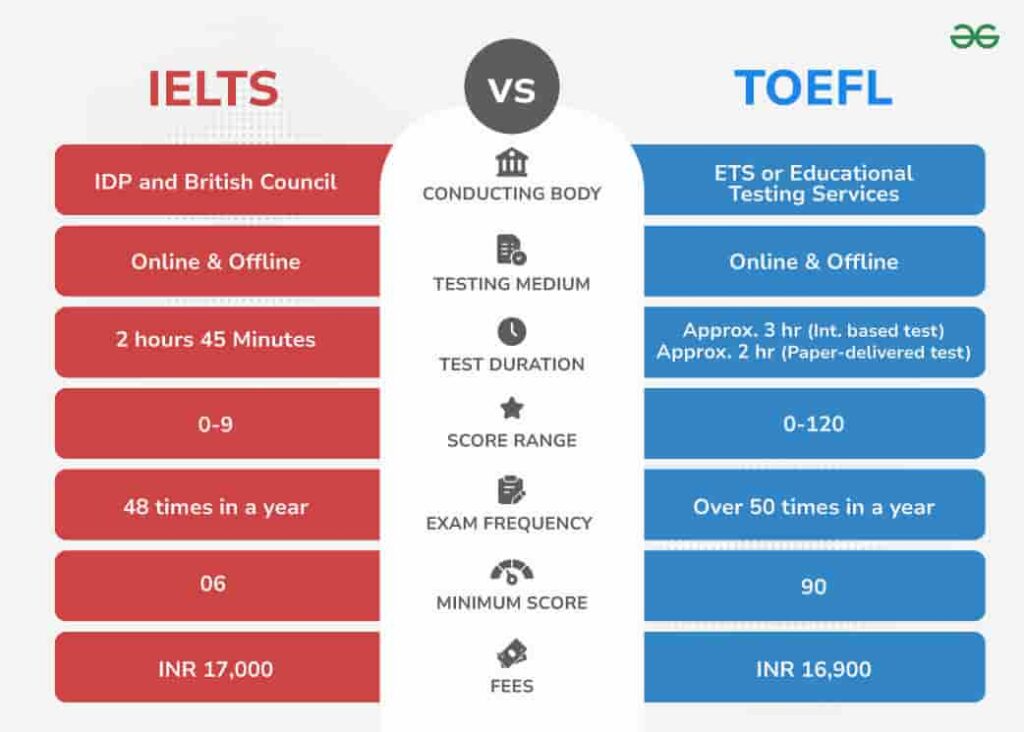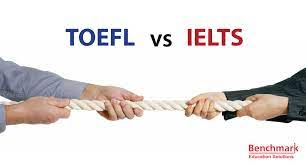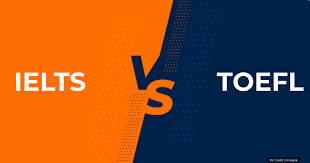Contents
As we all know that English is one of the most common languages in the world. Moreover, around 1 billion people are trying to learn English globally. If we consider learning English from this perspective, we will better understand the importance of English proficiency exams such as TOEFL vs IELTS. On the other hand, when it comes to personal development, we do not need to say how important it is to learn a foreign language such as English. We give importance to English proficiency exams and we believe that such test exams/certificates will contribute to everyone.

If we give a short answer to this question from the beginning, we could say that the validity of the TOEFL exam is more widespread especially in Western European, American and Canadian universities and private sector institutions. (Even though it is more difficult of course) On the other hand, IELTS still continues to be effective in England, New Zealand and in British-influenced countries and in some private institutions. In order to answer the question (whichone is important), first of all, we must answer the question of “What is the purpose of taking this exam?”.
As it is obvious, international or national universities may require these exams for student admission. Moreover, such English proficiency tests or certificates may be requested by important companies in recruitment exams or before the interview.
What Are TOEFL and IELTS Exams?

In this point, it is a real fact that while some universities or institutions accept TOEFL, others consider IELTS sufficient. If we aim to study in the USA or Canada, or if we have a career goal in important institutions internationally, it will be very appropriate to take the TOEFL exam and get a score of at least 80-85. What do we have to do for developing our English level in order to reach these scores is the subject of another article/field.
On the other hand, if we aim to study at a university in the UK, Ireland or areas under British influence in the future, it would be more reasonable to take the IELTS exam organized by the British Council. In the IELTS exam, which is scored between 1 and 9, it may be sufficient to get a score in the 6 or 6.5 band. However, in the business world it would not be right to say that the IELTS exam is preferred too much. In other words, it would be more logical to take the TOEFL exam if we are considering American-style schools or institutions.
In contrast, if we are considering schools or institutions from England or Britain, IELTS would be more convenient for us to take. Generally, If we compare both exams directly, it will be more correct to accept that TOEFL is more common.
TOEFL vs IELTS: Key Differences
The perspective of the distinction between academic English and general English will be very important in answering these questions. You will appreciate that academic English is much more difficult and complex than general English which includes words used in daily life. At this point, we have to emphasize that while TOEFL is an academic English exam in itself, IELTS has two different modules, general and academic. So, if you do not have to take an academic English exam for university application (unlikely) and the institution you are applying for does not have a TOEFL score requirement, it would be better to take the IELTS-General English Module exam.
It is very obvous that the General English module will be relatively easier than the IELTS-Academic English module. Please do not forget that TOEFL vs IELTS is an important question.

If we list the most important differences between these two exams:
Test Format
- TOEFL: Internet-based test (TOEFL iBT) with all sections completed on a computer.
- IELTS: Available in two formats: paper-based or computer-delivered, depending on the test center.
Speaking Section
- TOEFL: Recorded responses to prompts; no interaction with a person.
- IELTS: Face-to-face interview with an examiner.
Scoring System
- TOEFL: Scored on a scale of 0–120 (30 points for each section).
- IELTS: Scored on a band scale of 1–9 for each section, with an overall average score.
Test Duration
- TOEFL: About 3 hours.
- IELTS: About 2 hours and 45 minutes.
Listening Section
- TOEFL: Focuses on academic lectures and classroom conversations.
- IELTS: Includes a mix of academic and general listening scenarios (e.g., conversations in daily life).
Writing Section
- TOEFL: Requires typing two essays on a computer.
- IELTS: Involves one essay and a task to describe or interpret a chart, graph, or diagram (may be handwritten).
Purpose and Use of TOEFL vs IELTS
- TOEFL: Preferred by U.S. and Canadian universities.
- IELTS: Widely accepted in the U.K., Australia, New Zealand, and Europe; also suitable for immigration purposes.

Listening Different Accents is Important for TOEFL
In addition, in the IELTS listening section, you will encounter different accents of New Zealand, Ireland or England, while in the TOEFL listening section you will hear more American English accents. Although it may not seem like a big difference at first glance, our friends who focus on listening know that even small accent differences here will be very important when answering questions. In this article, we wanted to draw attention to which of the related TOEFL vs IELTS exams might be easier and the main differences between the exams. The most difficult thing for those who take this exam is these accent differences.
For example, it is much more difficult to understand what someone who speaks quickly with a Liverpool accent or a Scottish accent is than it is to understand someone who speaks with a very clear British accent. “Listening to a lot of different accents and practicing” is the easiest way and the key to overcome such difficulties .
We recommend you to learn a second language education if you want to develop yourself and to get English proficiency certificates that proves your this information. Finally, please do not forget how important English is. In addition, it is very important that you understand the importance of documenting this also.
